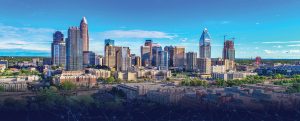Multifamily Market Overview
Denver, CO
This year, Denver’s multifamily sector has seen a shift in dynamics. Following a successful year in 2021, when the market saw excessive demand and skyrocketing rents, fundamentals have visibly cooled. Multifamily is a great inflationary hedge, and although fundamentals have slowed, demand is still very much present, and the sector is performing well. Investors must remember that even during an extreme recession or financial turbulence, people will always need a place to live. The absorption slowdown coincides with an increased building pipeline, setting Denver up for a record number of units currently under construction. Denver’s apartment delivery timeline is expected to return vacancies to pre-pandemic levels in the following quarters.
Highlights
- 25,000 units under construction is a record for the market and will increase Denver’s inventory by 8.8%.
- The impact on rent growth has been swift. Annual rent growth reached a record of 13% in 22Q1 but has decelerated to a current year-over-year figure of 3.2%.
- Denver ranks among top metros in terms of construction activity.
- Average rent levels in the region have reached $1,770/month, after rising by 3.2% in the last year.
Rents | Vacancy | Construction
Vacancies currently sits at seven percent and are projected to reach nine percent within the next two years due to the development pipeline in 2023. The vacancy rate is set to return to pre-pandemic levels by 2024. Unprecedented apartment demand generated record-breaking rent growth this past year. The Southeast Corridor witnessed some of the highest rent increases across submarkets. This is due to low vacancy rates and a wave of value-add improvements by landlords. Rent growth should continue to moderate from the highs recorded these past 12 months. At the moment, the daily asking rent resides at approximately $2.08 per square foot. Concerning construction activity, Denver consistently ranks among the top metros in the country. The apartment inventory in Denver has grown by 40 percent in the last decade. A record number of approximately 24,000 apartments are under development. Once these units are completed, Denver’s apartment inventory will increase by 8.8 percent. More than 90 percent of units added in the last decade were in high-end, four- and five-star communities.
The region’s average rent rose 3.2% last year to $1,770 per month.
Sales
Investors have not steered away from investing in multifamily, with $7.1 billion in sales volume recorded over the past 12 months. The fierce competition for multifamily assets in Denver has resulted in significant market price appreciation. In the recent year, the average market price per unit has climbed by 10 percent to $350,000/unit. On the other hand, concerns about rising interest rates and the looming prospect of a recession may dampen investment enthusiasm in the future. As investors flood into the area, cap rates have tightened, making it more difficult for investors to seek yield. Cap rates have been lower than the national average during this past year but remain higher than significant coastal markets such as New York and Chicago. It is important to note that Denver’s sale price per unit is about $100,000 higher than the U.S. average, exhibiting promising growth and prosperity for the market.
Cap rates have declined from 6% in 2012 to about 4.2% in Q4 2022.
Top 4 Transactions in the Market
| Address/ Name | # Of Units | Sale Price | Price per SF | Vacancy Rate |
| Ashford Belmar Apartment Homes
7301 W Ohio Ave |
512 | $259,609,656 | $422 | 6.3% |
| Arbour Commons at Orchard
663 W 148th Ave |
394 | $150,000,000 | $448 | 7.6% |
| Heights at Interlocken
401 Interlocken Blvd |
343 | $142,500,000 | $371 | 9.9% |
| 360 Degrees
7700 E Peak View Ave |
304 | $115,000,000
|
$376 | 5.3% |









